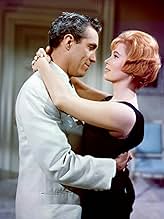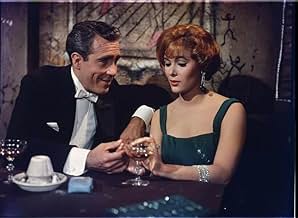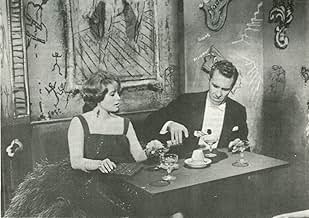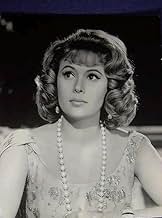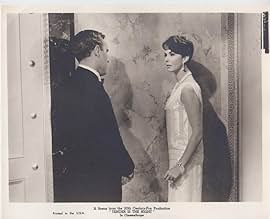Ajouter une intrigue dans votre langueA Psychiatrist and his life with a patient he helped to recover.A Psychiatrist and his life with a patient he helped to recover.A Psychiatrist and his life with a patient he helped to recover.
- Réalisation
- Scénario
- Casting principal
- Nommé pour 1 Oscar
- 1 victoire et 1 nomination au total
Jason Robards
- Dr. Richard 'Dick' Diver
- (as Jason Robards Jr.)
Avis à la une
and stilted about this film, and its casting.
Jason Robards who always delivers, just seems wooden and ineffectual as Dick Diver. Jennifer Jones as the ever desirable, but tragic Nicole Diver, just seems unsympathetic, even strident and cruel.
The alcohol flows freely and the jet-set lifestyle is invoked by a humorous Tom Ewell, who sings the movies theme song at the beginning of this disjointed movie. (Tom Ewell is forever planted in my memory as Marilyn Monroes bumbling neighbor in "The Seven Year Itch", or as the silly, clichéd father in "State Fair") That being said, it almost seems as if the writers did not know how to treat the subject of psychoanalysis and mental illness. F Scott Fitgerald and his wife endured tragedy, his wife Zelda Sayre Fitgerald was diagnosed with schizophrenia while still in her 20's. She was delusional at times, and probably never walked around at all times looking like a John Robert Powers model,(as Jones does in this movie).
It was 1962 after all, psychoanalysis was chic and stylish, so this film presents the illness as stylish and merely the effect of being rich and bored on the French Riviera. I wanted to like this film, but it is sorely dated and due for a remake. If nothing else it aptly demonstrates society stigma and misconceptions when portraying mental illness. No wonder there is still so much denial, if this film was considered an acceptable story of a physician and his wife in 1962. Worth seeing as a curiosity. 5/10.
Jason Robards who always delivers, just seems wooden and ineffectual as Dick Diver. Jennifer Jones as the ever desirable, but tragic Nicole Diver, just seems unsympathetic, even strident and cruel.
The alcohol flows freely and the jet-set lifestyle is invoked by a humorous Tom Ewell, who sings the movies theme song at the beginning of this disjointed movie. (Tom Ewell is forever planted in my memory as Marilyn Monroes bumbling neighbor in "The Seven Year Itch", or as the silly, clichéd father in "State Fair") That being said, it almost seems as if the writers did not know how to treat the subject of psychoanalysis and mental illness. F Scott Fitgerald and his wife endured tragedy, his wife Zelda Sayre Fitgerald was diagnosed with schizophrenia while still in her 20's. She was delusional at times, and probably never walked around at all times looking like a John Robert Powers model,(as Jones does in this movie).
It was 1962 after all, psychoanalysis was chic and stylish, so this film presents the illness as stylish and merely the effect of being rich and bored on the French Riviera. I wanted to like this film, but it is sorely dated and due for a remake. If nothing else it aptly demonstrates society stigma and misconceptions when portraying mental illness. No wonder there is still so much denial, if this film was considered an acceptable story of a physician and his wife in 1962. Worth seeing as a curiosity. 5/10.
This movie was a flop at the time and has been pretty much forgotten, which is a shame. It's a faithful adaptation of F.Scott Fitzgerald's moving story which is a touch lifeless, but still worthwhile.
The plot is ofcourse very good, a love story which is intriguing and very sad. There is perhaps not quite enough emotion throughout most of the film, but by the time the end comes the film has become pretty moving. Jason Robards was definately miscast as Dick Dyver [a good name for a porn star!]but Jennifer Jones shows what a good actress she sometimes could be ,especially when she is displaying her character's 'madness' ,if that's not too strong a word. None of the supporting characters are as interesting as they should be except Jill St John's aspiring actress and there is somehow little feel for the period, but the strength of the story just about carries one through. Mention should be made of Bernard Herrmann's often touching [if a bit self derivative!]music, but having the film's theme song [which he did not write] played endlessly on the piano by one character gets a bit annoying.
Despite it's flaws ,this is a fairly solid romantic drama that probably seemed old fashioned even in 1962, but deserves some reappraisal.
The plot is ofcourse very good, a love story which is intriguing and very sad. There is perhaps not quite enough emotion throughout most of the film, but by the time the end comes the film has become pretty moving. Jason Robards was definately miscast as Dick Dyver [a good name for a porn star!]but Jennifer Jones shows what a good actress she sometimes could be ,especially when she is displaying her character's 'madness' ,if that's not too strong a word. None of the supporting characters are as interesting as they should be except Jill St John's aspiring actress and there is somehow little feel for the period, but the strength of the story just about carries one through. Mention should be made of Bernard Herrmann's often touching [if a bit self derivative!]music, but having the film's theme song [which he did not write] played endlessly on the piano by one character gets a bit annoying.
Despite it's flaws ,this is a fairly solid romantic drama that probably seemed old fashioned even in 1962, but deserves some reappraisal.
**spoiler alert**
This movie does not have the greatest reputation in the world. I'd read that Jennifer Jones was too old to play Nicole, that she overacts, that she has no chemistry with Jason Robards, that it was too long, etc.
Well don't believe it!
It DID take me several attempts to watch the whole thing, but that nothing to do with the movie, that had to do with something else. When
I finally saw the whole thing all the way through, I enjoyed it very much and questioned why it does not have more admirers.
It explores many themes, thoughtfully and without exploitation. Should a doctor romance his patient? When does the patient stop being a patient, exactly, and start being a person?
Nicole meets Dick in a sanitarium. She's there for a variety of reasons, none of which sister Joan Fontaine really care to discuss. It has something to do with their father. Nicole eventually is released and runs into Dick years later, and they get married. They have a wonderful life and two children but it starts to fall apart. Not because of Nicole's mental state - actually, as it turns out, she becomes the stable one. But a friend of theirs (Tom Ewell, making a fool of himself as a chronic drunk) dies, their daughter almost dies from alcohol poisoning, and Dick is see with an actress (Jill St. John) at a brawl in a café and their picture makes all the front pages.
Jennifer Jones is prone to be very mannered. In spite of them she's still a favorite, but here she's really very good, she's not too old to play the part, and her chemistry with Robards is believable. Fontaine doesn't do much but enjoy her own wardrobe. As I mentioned, Ewell is a drunk but his death scene (or, rather, the circumstances surrounding it) are the worse thing in the movie. Jill St. John is first seen as a youngster but she matures as the movie progresses..unfortunately, her acting does not improve.
At over 2 1/2 hours, its an investment, but worth your time. Now I want to watch it again. 8/10.
This movie does not have the greatest reputation in the world. I'd read that Jennifer Jones was too old to play Nicole, that she overacts, that she has no chemistry with Jason Robards, that it was too long, etc.
Well don't believe it!
It DID take me several attempts to watch the whole thing, but that nothing to do with the movie, that had to do with something else. When
I finally saw the whole thing all the way through, I enjoyed it very much and questioned why it does not have more admirers.
It explores many themes, thoughtfully and without exploitation. Should a doctor romance his patient? When does the patient stop being a patient, exactly, and start being a person?
Nicole meets Dick in a sanitarium. She's there for a variety of reasons, none of which sister Joan Fontaine really care to discuss. It has something to do with their father. Nicole eventually is released and runs into Dick years later, and they get married. They have a wonderful life and two children but it starts to fall apart. Not because of Nicole's mental state - actually, as it turns out, she becomes the stable one. But a friend of theirs (Tom Ewell, making a fool of himself as a chronic drunk) dies, their daughter almost dies from alcohol poisoning, and Dick is see with an actress (Jill St. John) at a brawl in a café and their picture makes all the front pages.
Jennifer Jones is prone to be very mannered. In spite of them she's still a favorite, but here she's really very good, she's not too old to play the part, and her chemistry with Robards is believable. Fontaine doesn't do much but enjoy her own wardrobe. As I mentioned, Ewell is a drunk but his death scene (or, rather, the circumstances surrounding it) are the worse thing in the movie. Jill St. John is first seen as a youngster but she matures as the movie progresses..unfortunately, her acting does not improve.
At over 2 1/2 hours, its an investment, but worth your time. Now I want to watch it again. 8/10.
When this was released I managed to see most films first-run, except the ones clearly aimed at my age group. (Such a snob, n'est-ce pas?!?) So, being a fan of both Jennifer and Joan, I went to a Los Angeles-area theater with top-notch projection and sound. Back then Twentieth-Century Fox rarely stinted on sending companies to the actual locales of the stories being filmed, so this one has plenty of its share of gorgeous shots set in Switzerland and elsewhere on the Continent, as I recall.
But, as other comments herein attest, the rest is somewhat of a disappointment. Henry King, the director, seemed to encourage Jennifer Jones in some of her less-attractive mannerisms which somehow were not so apt as a rendition of her character's mental distress. Jason Robards, Jr. was never much of a success as a romantic lead, in my opinion. And Joan Fontaine was assigned the rather thankless role of a rich "bitch." All in all it's a prime example of how the studio "system" was growing out of touch with an ever-younger movie audience. Nevertheless for those of us who have always appreciated luxurious eye candy, it was a fairly tasty treat.
But, as other comments herein attest, the rest is somewhat of a disappointment. Henry King, the director, seemed to encourage Jennifer Jones in some of her less-attractive mannerisms which somehow were not so apt as a rendition of her character's mental distress. Jason Robards, Jr. was never much of a success as a romantic lead, in my opinion. And Joan Fontaine was assigned the rather thankless role of a rich "bitch." All in all it's a prime example of how the studio "system" was growing out of touch with an ever-younger movie audience. Nevertheless for those of us who have always appreciated luxurious eye candy, it was a fairly tasty treat.
Well, c'est la vie.
A wonderful cast and beautiful scenery are the highlights of "Tender is the Night," a 1962 film starring Jason Robards, Jennifer Jones, Tom Ewell, Joan Fonaine, Jill St. John, and Paul Lukas. The film is based on a book by F. Scott Fitzgerald.
Fitzgerald wrote beautiful prose, but much of his work has been difficult to adapt to the screen. He himself worked as a writer in Hollywood but wound up uncredited on most of the scripts and told someone that he did recognize one of his lines in a film that evidently had not been cut from a script.
In this film, Robards plays Dick Driver, a psychiatrist who falls for one of his patients, Nicole (Jones). Nicole is being treated for mental instability, the result of incest (though this is only hinted at). When Dick realizes his feelings, and hers, he quickly distances himself, but she runs into him after she leaves the sanitarium and the two wind up getting married.
Nicole is filthy rich, and the money is controlled by her sister (Joan Fontaine). Dick gets lulled into the good life, the parties, the travel, the luxury, and while he intends to return to his work at the sanitarium and finish a book, he doesn't go. This is mainly because the insecure and sometimes paranoid Nicole is resistant. When he finally returns to the sanitarium, his mentor (Lukas) is dying and the sanitarium has been taken over by a colleague, who only wants Driver's investment. Driver refuses, since he would have to get the money from Nicole, but she insists. But for Driver, it feels like it's all too late.
The acting is superb and Jones, one of my favorites, looks gorgeous throughout. She is somewhat nervous and mannered as Nicole, but that's the character, and she captures her. Robards is strong, emotional, and excellent as the deeply convicted Driver. And how wonderful to see Paul Lukas. I actually recognized his voice and then looked at his face -- I'm so used to seeing him in movies made 20 years earlier that I didn't recognize him at first.
The problem with the film for me is that so much that goes on is beneath the surface -- this can be a fascinating feature, but it is directed at too leisurely a pace by Henry King. The St. John character is never really fleshed out, she darts in and out of the picture; ditto the drunken composer played by Tom Ewell. We just don't know enough about him to care. Joan Fontaine wears some great clothes and acts well, and we do get to know her somewhat.
The other problem is the time in which it is set, which seems a bit generic. It's supposed to be the '20s - I can tell by the music - but not by anything else. The ambiance is '60s.
Nevertheless, Tender is the Night was an ambitious project that probably could have used some judicious editing, but if you're a Jones fan you won't want to miss it.
A wonderful cast and beautiful scenery are the highlights of "Tender is the Night," a 1962 film starring Jason Robards, Jennifer Jones, Tom Ewell, Joan Fonaine, Jill St. John, and Paul Lukas. The film is based on a book by F. Scott Fitzgerald.
Fitzgerald wrote beautiful prose, but much of his work has been difficult to adapt to the screen. He himself worked as a writer in Hollywood but wound up uncredited on most of the scripts and told someone that he did recognize one of his lines in a film that evidently had not been cut from a script.
In this film, Robards plays Dick Driver, a psychiatrist who falls for one of his patients, Nicole (Jones). Nicole is being treated for mental instability, the result of incest (though this is only hinted at). When Dick realizes his feelings, and hers, he quickly distances himself, but she runs into him after she leaves the sanitarium and the two wind up getting married.
Nicole is filthy rich, and the money is controlled by her sister (Joan Fontaine). Dick gets lulled into the good life, the parties, the travel, the luxury, and while he intends to return to his work at the sanitarium and finish a book, he doesn't go. This is mainly because the insecure and sometimes paranoid Nicole is resistant. When he finally returns to the sanitarium, his mentor (Lukas) is dying and the sanitarium has been taken over by a colleague, who only wants Driver's investment. Driver refuses, since he would have to get the money from Nicole, but she insists. But for Driver, it feels like it's all too late.
The acting is superb and Jones, one of my favorites, looks gorgeous throughout. She is somewhat nervous and mannered as Nicole, but that's the character, and she captures her. Robards is strong, emotional, and excellent as the deeply convicted Driver. And how wonderful to see Paul Lukas. I actually recognized his voice and then looked at his face -- I'm so used to seeing him in movies made 20 years earlier that I didn't recognize him at first.
The problem with the film for me is that so much that goes on is beneath the surface -- this can be a fascinating feature, but it is directed at too leisurely a pace by Henry King. The St. John character is never really fleshed out, she darts in and out of the picture; ditto the drunken composer played by Tom Ewell. We just don't know enough about him to care. Joan Fontaine wears some great clothes and acts well, and we do get to know her somewhat.
The other problem is the time in which it is set, which seems a bit generic. It's supposed to be the '20s - I can tell by the music - but not by anything else. The ambiance is '60s.
Nevertheless, Tender is the Night was an ambitious project that probably could have used some judicious editing, but if you're a Jones fan you won't want to miss it.
Le saviez-vous
- AnecdotesThe Divers are based on real-life couple Gerald and Sara Murphy, friends and patrons of the famous, including the author of this story, F. Scott Fitzgerald. Poet Archibald Macleish once said of the Murphys that "there was a shine to life wherever they were".
- GaffesThe American flag adorning the child's sand castle has its stars arranged in the staggered rows of 5 and 6 stars as in the current 50 stars arrangement. An American flag of the 1920's would have had its stars in the 6 rows of 8 arrangement.
- Citations
Mr. Albert Charles McKisco: What's your place in the economy of life, Barban?
Tommy Barban: I shoot
Mr. Albert Charles McKisco: Just any old thing, huh?
Tommy Barban: Well, er... buffalo in Africa, tigers in India, Bolsheviks in Europe...
Mr. Albert Charles McKisco: Don't you ever get the urge to do anything?
Tommy Barban: Yes. I would like to restore the Holy Roman Empire.
- ConnexionsFeatured in 20th Century-Fox: The First 50 Years (1997)
- Bandes originalesTender Is the Night
Music by Sammy Fain
Lyrics by Paul Francis Webster
Sung by an off-screen vocal group during the opening credits
Meilleurs choix
Connectez-vous pour évaluer et suivre la liste de favoris afin de recevoir des recommandations personnalisées
- How long is Tender Is the Night?Alimenté par Alexa
Détails
Box-office
- Budget
- 3 900 000 $US (estimé)
- Durée2 heures 22 minutes
- Couleur
- Rapport de forme
- 2.35 : 1
Contribuer à cette page
Suggérer une modification ou ajouter du contenu manquant

Lacune principale
By what name was Tendre est la nuit (1962) officially released in India in English?
Répondre



